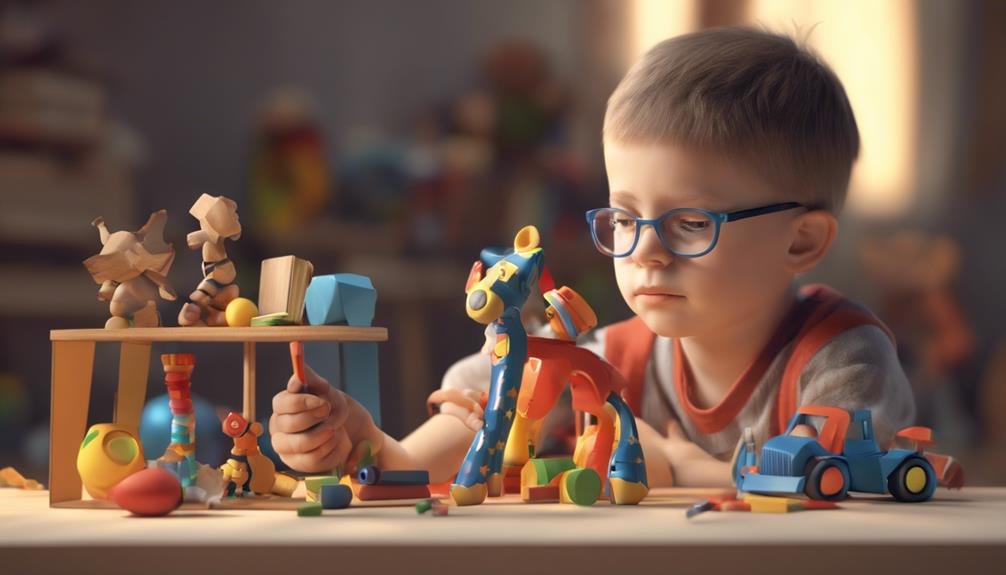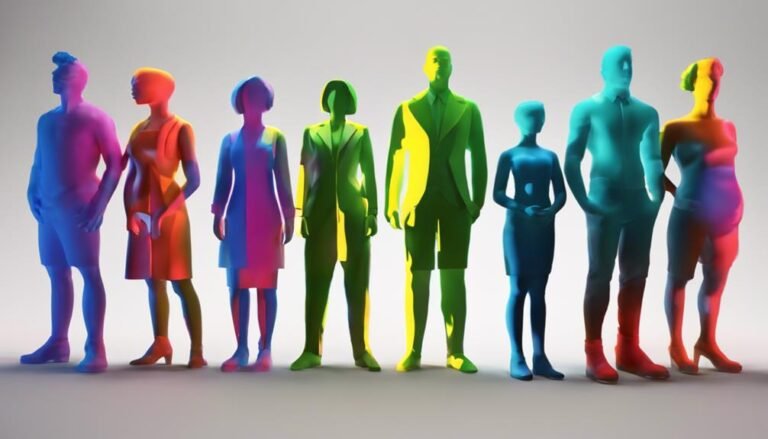Bandura’s Social Learning Theory: An Overview
Explore the intricate web of Bandura's Social Learning Theory as it unravels the complexities of human behavior and development. Discover how observation, imitation, and cognitive processes intertwine to shape our understanding of learning mechanisms. From the nuances of modeling behavior to the compelling influence of vicarious reinforcement, Bandura's theory offers a fresh perspective on the ways we acquire skills and navigate social interactions. As you investigate further into this theory, you'll uncover its profound implications for psychology and its enduring relevance in understanding human behavior.
Key Takeaways
- Emphasizes learning through observation and imitation.
- Focuses on cognitive processes in learning.
- Demonstrates the importance of direct experiences and observing others.
- Observational learning critical for acquiring new skills and behaviors.
- Modeling behavior plays a significant role in shaping actions and attitudes.
Background of Bandura's Theory
Bandura's Social Learning Theory, developed by psychologist Albert Bandura, stems from the idea that individuals learn behaviors through observation and imitation of others. Bandura's research focused on the role of cognitive processes in learning, highlighting the importance of mental activities in understanding behavior.
Through his studies, Bandura demonstrated that individuals not only learn through direct experiences but also through observing others.
Bandura's experiments, such as the famous Bobo doll study, showcased how children imitated aggressive behaviors they witnessed. This research emphasized the significance of cognitive factors in shaping behavior, showing that individuals can learn new behaviors without direct reinforcement.
Bandura's theory suggests that observational learning plays a critical role in acquiring new skills and behaviors, highlighting the intricate interplay between cognition, behavior, and the environment.
Observational Learning Process
You'll explore the foundational aspects of observational learning in Bandura's Social Learning Theory.
This process involves modeling behavior and imitation as key mechanisms for acquiring new skills and behaviors.
Understanding how individuals observe and replicate actions in their environment sheds light on the intricate nature of learning through observation.
Modeling Behavior
Observational learning, a key component in Bandura's Social Learning Theory, involves individuals acquiring new behaviors by observing and imitating others. This process plays a significant role in behavior modification and cognitive development. Through observing the actions of others, individuals can learn new social skills and understand cultural norms.
Bandura highlighted the importance of modeling behavior in shaping one's actions and attitudes. Research indicates that observational learning can lead to both positive and negative outcomes. By observing positive behaviors in others, individuals can adopt these behaviors and enhance their own skills. Conversely, exposure to negative behaviors may result in individuals imitating these actions, leading to detrimental consequences.
Understanding the mechanisms behind modeling behavior is essential for educators, parents, and psychologists. By recognizing the impact of observational learning, interventions can be designed to promote positive behavior modeling and discourage harmful actions. Studying how individuals imitate behaviors can provide insights into cognitive processes and social interactions, contributing to a deeper comprehension of human behavior.
Imitation in Learning
Modeling behavior through imitation is an essential aspect of observational learning, influencing how individuals acquire new behaviors and develop social skills.
Imitation benefits individuals by allowing them to observe and replicate actions, leading to the acquisition of new skills and behaviors. Learning through observation plays a vital role in the development of social competence and adaptive behaviors.
By observing others, individuals can learn from their experiences without having to undergo trial and error themselves. This process not only accelerates learning but also fosters a deeper understanding of complex behaviors and social interactions.
Research indicates that imitation serves as a powerful mechanism for learning, particularly in social contexts. Individuals are more likely to imitate behaviors they observe in others if they perceive the model as competent, successful, or similar to themselves.
Additionally, the act of imitation can strengthen social bonds and facilitate communication among individuals. Understanding the significance of imitation in learning underscores the importance of observational learning in shaping behavior and social development.
Role of Modeling in Learning
Individuals acquire new behaviors through the process of observing and imitating others, a fundamental aspect of social learning theory. Modeling plays a significant role in learning by influencing cognitive processes and social interactions. When individuals observe a model performing a behavior and receiving positive reinforcement, it can enhance their motivation to imitate the behavior. Cognitive processes such as attention, retention, reproduction, and motivation are engaged during the modeling process.
Attention is essential for observing the model's actions, retention involves storing the observed behavior in memory, reproduction is the physical capability to imitate the behavior, and motivation determines the likelihood of replicating the behavior.
Furthermore, modeling not only impacts individual learning but also influences social interactions. Observing and imitating behaviors of others can lead to the spread of certain behaviors within a social group. This process can shape norms, values, and behaviors within a community. Consequently, modeling serves as a powerful mechanism through which individuals learn and adapt to their social environment.
Four Key Components Defined
To understand Bandura's Social Learning Theory deeply, it's essential to grasp the four key components that define this influential theory.
The first component is learning outcomes, which emphasize the importance of observing and imitating others to acquire new behaviors. Through social interaction, individuals can learn from the experiences of those around them, leading to cognitive development and behavioral changes. Bandura highlighted the significance of observational learning in shaping behavior, arguing that individuals can learn simply by observing others without direct reinforcement.
The second key component is social interaction, which plays an essential role in the learning process. Bandura posited that individuals learn not only through their own experiences but also through interactions with others. These social interactions provide opportunities for individuals to observe, model, and imitate behaviors, ultimately influencing their cognitive development and behavioral changes.
Vicarious Reinforcement and Punishment
How does vicarious reinforcement and punishment influence behavior according to Bandura's Social Learning Theory?
In Bandura's theory, individuals learn through observation and imitation of others, known as social modeling. When observing someone else being reinforced for a particular behavior, individuals are more likely to replicate that behavior themselves. This is known as vicarious reinforcement.
On the other hand, witnessing someone being punished for a behavior can lead individuals to refrain from engaging in that behavior, known as vicarious punishment.
Vicarious reinforcement and punishment play an essential role in shaping behavior by demonstrating the consequences of actions without the individual having to directly experience them. Through social modeling, individuals can learn about the potential positive and negative outcomes of behaviors, influencing their own choices and actions.
Application in Education
You can apply Bandura's Social Learning Theory in education by implementing classroom modeling techniques. This involves teachers demonstrating desired behaviors for students to observe and imitate.
Additionally, creating peer learning opportunities can further enhance the social learning process in educational settings.
Classroom Modeling Techniques
In the field of education, implementing Bandura's Social Learning Theory through classroom modeling techniques is a strategic approach to fostering observational learning among students. Behavior modification and student engagement are key components of this method.
By incorporating teacher demonstration and promoting interactive learning experiences, educators can effectively model desired behaviors and skills for their students to observe and emulate.
Through teacher demonstration, students have the opportunity to witness firsthand how concepts are applied in practice. This modeling technique provides a clear example for students to follow, aiding in their understanding and retention of new information.
Interactive learning further enhances this process by actively engaging students in the learning experience, allowing them to participate in activities that reinforce the modeled behaviors.
Peer Learning Opportunities
Peer learning opportunities in education provide a valuable platform for students to collaborate and enhance their understanding through shared experiences and perspectives. Group collaboration is an essential aspect of peer learning, allowing students to work together towards a common goal while fostering interactive learning environments.
By engaging in collaborative projects, students not only deepen their comprehension of the subject matter but also develop essential teamwork skills. Team dynamics play a vital role in peer learning settings, as students learn to communicate effectively, delegate tasks, and problem-solve collectively.
Research indicates that peer learning opportunities contribute to improved academic performance, increased motivation, and enhanced critical thinking skills. Through peer interactions, students can gain diverse insights, receive constructive feedback, and expand their knowledge base beyond traditional classroom settings.
Emphasizing peer learning in educational practices encourages active participation and empowers students to take ownership of their learning process. Ultimately, incorporating peer learning opportunities into curriculum design can enrich the educational experience, promote social connections, and nurture a supportive learning community.
Implications for Psychology
Bandura's Social Learning Theory carries significant implications for the field of psychology, particularly in understanding how individuals acquire and exhibit behaviors through observational learning processes. In clinical settings, this theory has led to the development of therapeutic interventions that focus on modeling desired behaviors to promote positive change.
By emphasizing the role of observational learning, Bandura's theory has also shaped the field of developmental psychology, highlighting the importance of social interactions in shaping behavior and personality.
The theory's emphasis on the impact of social models on behavior has provided valuable insights into how individuals learn new behaviors through observation and imitation. This understanding has influenced therapeutic approaches that utilize modeling techniques to help individuals acquire adaptive behaviors.
Additionally, in the domain of developmental psychology, Bandura's theory underscores the significance of social interactions in shaping cognitive and behavioral development, highlighting the role of peers, parents, and other social influences in the learning process.
Social Learning in Everyday Life
You can observe how observational learning impacts your behavior in everyday life, as Bandura's Social Learning Theory suggests.
For instance, watching a friend successfully negotiate a conflict might influence your own conflict-resolution skills.
Behavior modeling, such as imitating a parent's communication style, is another common example of social learning in action.
Observational Learning Impact
An essential aspect of observational learning impact lies in the transmission of behaviors and attitudes through modeling behaviors in social interactions. Bandura's Social Learning Theory emphasizes the cognitive development that occurs when individuals observe and imitate others. Through social interactions, individuals learn not only specific behaviors but also the underlying cognitive processes and reasoning behind them. This process plays a significant role in shaping one's understanding of the world and the ways in which they navigate social situations.
Observational learning impacts various aspects of everyday life, from acquiring new skills to developing attitudes and beliefs. By observing others, individuals can learn how to perform tasks more efficiently, modify their behaviors based on social norms, and even adopt new perspectives on different issues.
This form of learning is particularly influential during childhood when cognitive development is rapid and social interactions play a significant role in shaping behavior. Understanding the impact of observational learning can provide insights into how individuals acquire and adapt behaviors based on the models they observe in their social environment.
Behavior Modeling Examples
Observational learning impact extends to various contexts, showcasing how behavior modeling examples in everyday life exemplify social learning theory in action. Behavior analysis reveals that individuals often learn through observing others and modeling their actions.
For instance, children imitate the behavior of their parents or peers, learning new skills or adopting certain attitudes through this process. Cognitive processes play an essential role in this learning mechanism, as individuals actively engage in mental activities such as attention, retention, reproduction, and motivation when observing others' behaviors.
Social interactions provide the platform for behavior modeling to occur, influencing learning outcomes substantially. In educational settings, teachers' behaviors serve as models for students, shaping their academic performance and social skills. Additionally, in professional environments, employees may emulate successful colleagues to improve their own job performance.
Understanding behavior modeling examples in everyday life underscores the pervasive nature of social learning and highlights its impact on individual development and societal norms.
Criticisms and Controversies
Critiquing Bandura's Social Learning Theory involves examining both its strengths and weaknesses in the context of empirical evidence and theoretical implications. One ethical concern raised is the potential for observational learning to be used in a negative context, such as when individuals imitate violent behaviors they've witnessed. This raises questions about the responsibility of those presenting such behaviors as models.
Additionally, research limitations in Bandura's theory include the reliance on laboratory settings, which may not fully capture the complexities of real-world social learning environments. Critics argue that Bandura's theory oversimplifies the role of reinforcement and punishment in influencing behavior, neglecting other important factors.
Despite these criticisms, Bandura's Social Learning Theory has made a significant contribution to our understanding of how individuals learn from observing others. By acknowledging these criticisms and controversies, researchers can work towards refining and expanding the theory to better reflect the intricacies of social learning processes.
Modern Relevance and Future Research
Exploring the contemporary applications and potential avenues for further investigation in Bandura's Social Learning Theory involves analyzing its adaptability to modern societal dynamics and technological advancements. In today's digitally interconnected world, technology integration and social media influence play pivotal roles in shaping individuals' behaviors and learning processes. Bandura's theory provides a framework to understand how observational learning occurs not only in face-to-face interactions but also through online platforms and virtual environments.
Moreover, the concept of cultural adaptation within Bandura's Social Learning Theory becomes increasingly relevant as societies experience generational shifts and multicultural influences. Understanding how individuals from diverse backgrounds acquire and transmit knowledge can help in fostering cross-cultural understanding and effective communication strategies.
As researchers explore deeper into the modern applications of Bandura's Social Learning Theory, there's a growing need to investigate its implications for educational practices, professional development, and behavioral interventions in the digital age. Future studies could focus on examining the effectiveness of incorporating social learning principles into online education platforms, virtual training programs, and digital mentoring initiatives to enhance learning outcomes and promote positive social behaviors.
Conclusion
To sum up, Bandura's Social Learning Theory offers a valuable framework for understanding how individuals learn through observation and imitation. By emphasizing the role of cognitive processes, modeling behavior, and vicarious reinforcement, this theory sheds light on the complexities of behavior modification and social interactions.
Despite criticisms, Bandura's theory remains relevant in modern psychology, providing insights into how individuals acquire new skills and behaviors through observational learning. Explore the power of observation and modeling in shaping behavior and cognitive development.







